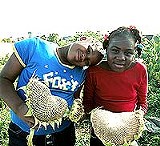[
{
"name": "500x250 Ad",
"insertPoint": "5",
"component": "15667920",
"parentWrapperClass": "",
"requiredCountToDisplay": "1"
}
]
"Look, these are done," cries fifth grader Lekisha Mitchell as she tests the weight of a ripening sunflower head. Behind her and friend Terri Burnett, also a fifth grader, the row of flowers stretches almost to a vanishing point beside School 9 on North Clinton Avenue.
The sunflowers, though, are only a garnish. The most significant feature of this piece of urban land is a community garden --- and it looks ready for picking. There are tomatoes, cabbages, broccoli, collards, carrots, even a second harvest of late strawberries.
The garden makes the corner of North Clinton and Upper Falls Boulevard, one of northeast Rochester's busiest intersections, look almost rural. The street noise disturbs the illusion, especially when school's letting out. But look to either side of the small plot and you see reality. On one side you see an eight-foot fence topped with barbed wire; to the other side, much farther away, you see a low-profile plant and parking lots. This is the property of Coca-Cola Bottling Company, which for the past four years has loaned the space to a not-for-profit group.
But pretty soon the garden will turn fallow, and not just because of winter. Coke has told the gardeners they'll need pull up stakes and find new land.
What are a garden and a bunch of elementary school kids doing here anyway? Learning the very basics.
Formally, the garden is a project of Politics of Food, an organization based in downtown Rochester that tries to re-connect people with the soil. POF set up shop on the Coca-Cola site to bring in students from School 9 next door. School 9 principal Sharon Jackson couldn't be reached for comment. But watching the students at work in the garden makes a clear statement --- they're enthusiastic about getting down to earth this way.
A City School District blurb calls the garden "a living, hands-on learning experience for students, who learn about plants and the environment." The learning takes place not only outdoors, but in the school's "grow lab," where the plants are started from seed, and in the classroom where students write about their experiences.
The measuring tools are not standardized, and more real for it. "I thought it was good to grow vegetables," says Lekisha Mitchell. "We learn about nutritious foods to eat, how our bodies work," she says. Terri Burnett breaks in: "... how to keep our bodies healthy."
"We take the vegetables home and eat them with our families," adds Terri, who like other participants lives a few blocks away.
After four years, the garden looks well dug in --- but with the Coke deal at an end, the looks are deceiving.
At the beginning of October, POF members learned Coca-Cola was withdrawing its permission to use the space. "It came as a real surprise to us," says POF project organizer Mark House. The garden, he says, was just ready for mulching, and in fact he'd recently approached Coca-Cola about using more of the vast lawn. Now he's searching for an alternative garden space nearby, maybe off Joseph Avenue.
City Hall may help find a suitable space, House says. A big issue is walking distance. "Most of the children don't have transportation, and that increases our [location] problem," he says.
Why is Coke shifting gears right now? What are the company's issues?
"In general, the property [will be] restricted to activities for official business only," says Downstate-based spokesperson Harriet Tolve, to whom our inquiries were forwarded.
"Because of the heightened threat environment [post September 11], we've had to make this change," she says. Could Coke sell or lease the space to POF or another entity? No, says Tolve, again citing security concerns. Other users of the property have been asked to leave, too, she says, including some people who've been borrowing some parking spaces.
Mark House says City Hall may help find an alternative space for the POF garden. But whatever happens beyond this growing season, House and his group have wider ambitions. "The School 9 program is a model," says House. "We hope to have a garden program in every elementary school in the city," he says. Indeed, he says, POF already runs such programs at School 4 and School 36. Another program, he says, is under development at School 20, and there's one ongoing at St. Michael's Roman Catholic Church on North Clinton.
House also would like to see the student gardeners bringing their surpluses to the Public Market. He draws a parallel with the North East Neighborhood Association's "GRUB" (Greater Rochester Urban Bounty) project, for which POF supplies some technical know-how. GRUB's community garden, appropriately focused on a 2.5-acre urban mini-farm, already has a sales stand on the north side of the Market. (Earlier this year, GRUB bagged a $1 million W.K. Kellogg Foundation grant for its work.)
Things could grow well beyond the city, too. "We hope eventually to take a more regional approach," says House. The idea, he explains, is to get urban, suburban, and rural kids together. There are possibilities for bringing old and young together, as well. For example, House says he's involved with a "Community Supported Agriculture" group now forming in Canandaigua. "CSAs" link farmers directly to consumers; the farmers (and often organizational supporters) provide the land; the consumers invest their sweat and reap a portion of the harvest.
Interest in another kind of CSA -- "Congregational Supported Agriculture," which links farms and religious communities --- is also on the rise, says House. He notes, too, that St. Paul's Episcopal Church on East Avenue and the Unitarian Church on South Winton Road already are supporting urban community gardens.
When they were sizing up the sunflowers, students Lekisha Mitchell and Terri Burnett didn't realize their beloved garden will have to move or die.
Nor did they know they're part of a national movement that has seen ups and downs, and even struggles.
Many North American cities have become home to community gardens. The structure can vary: Some gardens are run collectively, with members dividing the produce and/or sharing it with neighbors. Others are checkerboards of individual small plots. Some gardens, as throughout New York City's lower-income areas, occupy vacant lots and restored wastelands. Others, as in Toronto's High Park, use long-held public land that's been set aside for the purpose.
But too frequently the gardens aren't granted tenure, so to speak.
During the 1990s economic boom in New York, for example, real estate interests, with the backing of former mayor Rudy Giuliani, sought to turn many of the city's 700 publicly-owned, neighborhood-controlled community gardens into upscale apartment buildings and the like. Faced with seeing their handiwork bulldozed and/or auctioned off, gardeners protested, even to the extent of chaining themselves to fence posts. The gardens lost a little ground, but the resistance "galvanized support for community gardening," says a report from a Big Apple-based group called Just Food.
The Just Food report makes it clear the stakes are high for some. Community gardens now provide a big slice of many urban residents' daily food requirements, for example. And this role will become more important as a teetering economy drives more and more people to emergency food providers.
The typical community garden produces food of high quality, too --- organic, fresh, packed with nutrients. Maybe, you might hope, of sufficient quality to compensate for the high volume of carbonated beverages in the American diet.
Latest in News
More by Jack Bradigan Spula
-

The state of Main
Apr 14, 2004 -
School improvement: the price is wrought
Apr 7, 2004 -
Hour of power
Mar 31, 2004 - More »






